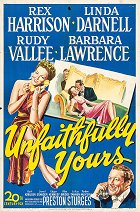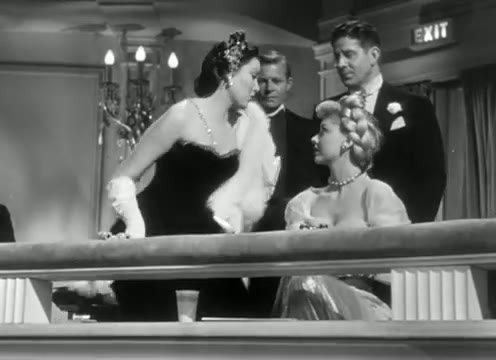Regie:
Preston SturgesDrehbuch:
Preston SturgesKamera:
Victor MilnerBesetzung:
Rex Harrison, Linda Darnell, Rudy Vallee, Barbara Lawrence, Lionel Stander, George Melford, Isabel Jewell, Laurette Luez, Ruth Clifford, Sam Harris (mehr)Inhalte(1)
Ein berühmter und erfolgreicher Dirigent vermutet, daß er von seiner Ehefrau betrogen wird. Während eines Konzerts spielt er in seiner Phantasie einige mögliche Racheszenarien durch, die aber alle an ganz alltäglichen Dingen scheitern. (Verleiher-Text)
Kritiken (1)
Clearly the last really good film by the prematurely burnt-out Preston Sturges, Unfaithfully Yours is a genre hybrid that mixes Hitchcockian thriller with pure slapstick and in some ways anticipates the black comedies of the Ealing studio and the Coen brothers’ films (the characters are kind of idiots in all cases). Several unexpectedly modern ideas (such as the abrupt changes in tone), which caused the film to be rejected by audiences at the time and ended Sturges’s reign as the king of Hollywood, are unfortunately spread out over a space that’s significantly larger than the simple plot needs. The “design” problems become apparent during the drawn-out exposition, which takes a long time to let viewers know what’s actually going on in the film. It is impossible not to notice how Sturges enjoys playing with words and their possible meanings, but it is also impossible to overlook how he forgets to tell the story (through images) and guide the actors. For example, Harrison’s theatrical training is quite obvious in places, which may also be due to the theatrical design of many of the scenes. In contrast with these dead spots, some of the diversions into slapstick are built up brilliantly and, thanks to their compositional motivation, do not come across as forced. (Staging the attempted murder in a way that is diametrically opposed to the conventions of classic Hollywood directs our attention to the style instead of the narrative, while the motif of variation, which is inherently connected with the music, is fleshed out.) If Alfred does not appear in his visions, over which he has full control, his life resembles a farce with a protagonist against whom not only other people but also inanimate objects conspire. The protagonist’s need to direct his own life and the lives of those closest to him (which he succeeds in doing only illusorily) actually reflects the directorial profession. It would probably be overreaching to call Unfaithfully Yours an autobiographical film because of this, though, on the other hand, Sturges was undoubtedly a filmmaker with a well-developed capacity for self-reflection enabling him to consciously incorporate into screenplays allusions to the therapeutic function of artistic expression, just as a complex-ridden artist commits a story to celluloid, for example, instead of committing a murder. 65%
()

